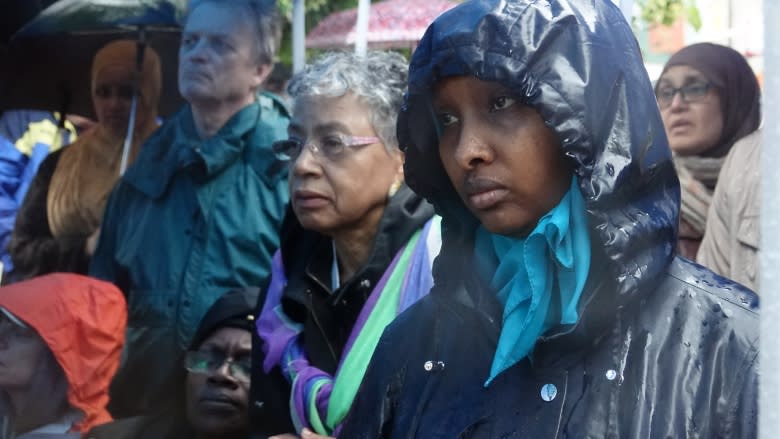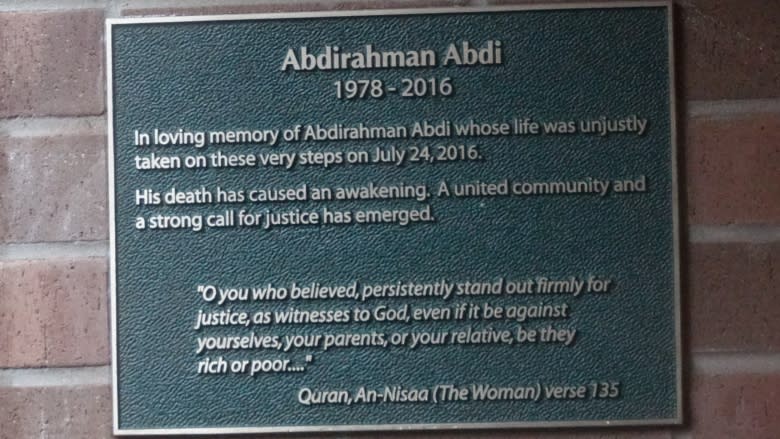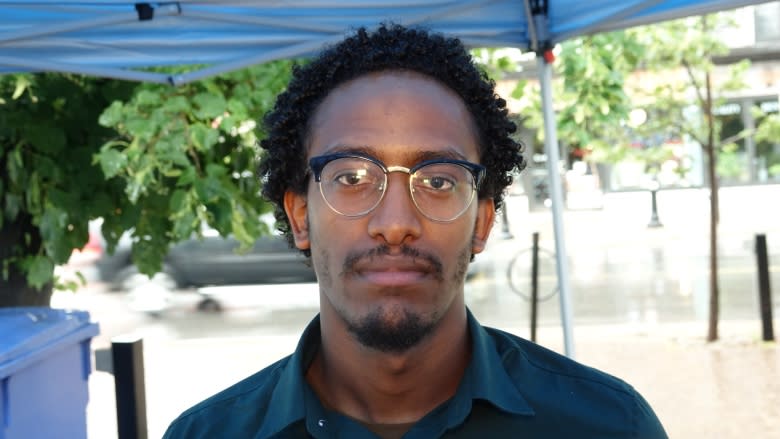'An awakening': Plaque unveiled to mark anniversary of Abdirahman Abdi's death
Nearly 150 people huddled under tents and umbrellas in heavy rain Monday evening for the unveiling of a plaque in memory of Abdirahman Abdi, the Somali-Canadian man who died a year ago after a violent arrest by Ottawa police.
The plaque was unveiled at 55 Hilda St. in Hintonburg, above the steps where the fatal confrontation with police happened on July 24, 2016. Abdi was pronounced dead in hospital the next day after losing vital signs during the arrest.
The plaque includes a verse from the Qur'an about seeking justice, no matter the consequences. It also says Abdi's "life was unjustly taken" and that his death created an "awakening" in the community.
One of Abdi's brothers unveiled the plaque and quickly rushed inside afterward, choked up and on the verge of tears.
Const. Daniel Montsion is facing charges of manslaughter, aggravated assault and assault with a weapon in Abdi's death. He's scheduled to face a judge-only trial beginning in February 2019.
Dahabo Ahmed Omer, co-chair of the Justice for Abdirahman Coalition, said a conviction is needed for the community to feel like justice has been done.
"There were individuals that witnessed what happened, and I think it's important for the community to know that when something this wrong happens, our justice system is built in such a way that it ensures it doesn't happen again," she told CBC News Ottawa anchor Adrian Harewood.
"I think we need to see that go forward for it to feel like justice, absolutely."
'Wake-up call'
Lelam Abebe attended the memorial for Abdi last year and has lived in Ottawa since he was six years old. He said the incident was a "wake-up call" for him and cast a different light on his own experience with police as a person of colour.
"The biggest thing that we can do is identify with Abdi and see that person in our brother, and see that person in ourselves, and I try to do that," he said.
Abebe started attending community meetings about race issues with police and wants to see the momentum that has built up in the wake of Abdi's death continue, he said.
Hodan Farah called Abdi's death unjust and said that while the community supports the police, they want an open dialogue that acknowledges what happened was wrong.
"Every citizen, whether Somali or any other [group], does not deserve to be treated that way. And it's important that we — as Canadians, together — stand up for a cause such as this, to prevent any other incidents happening again," she said.
'A difficult year,' police chief says
Ottawa police Chief Charles Bordeleau said his service has been working hard to rebuild the trust that was lost and "fractured" after Abdi's death.
"There's no question that this has been a difficult year for this police service, for the family and for the officer involved subsequent to the death," Bordeleau said.
The chief pointed to the creation of an outreach group to engage with members of Ottawa's Somali community, which heard from more than 1,000 people in its first six months, as an example of the police service's work to rebuild that relationship.
Among the issues that kept rising from that consultation were accountability, racial profiling and a general lack of trust. Now that the process is over, Bordeleau said police plan to use the feedback to build an action plan for what they call "bias-neutral policing."
Police will also conduct a "diversity audit" focused on recruiting and human resources practices, he said.
"The community has told us for years that they wanted to ensure that we are reflective of our community," he said.
"Our members internally have also said that they want to make sure that we are a police service that treats people with equality and gives people the same opportunities as others."
The conversation is ongoing with the community and members of the Justice for Abdirahman Coalition, he said.






